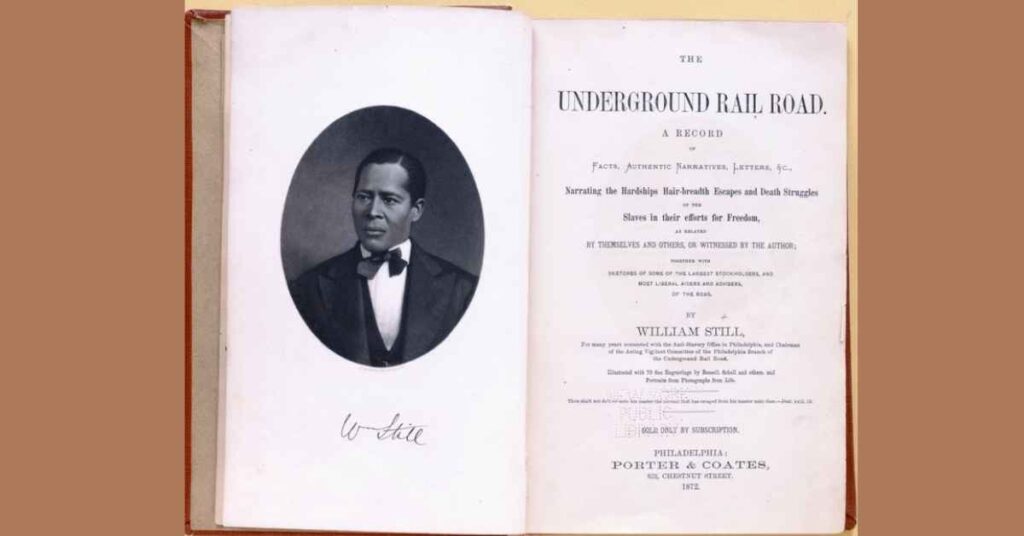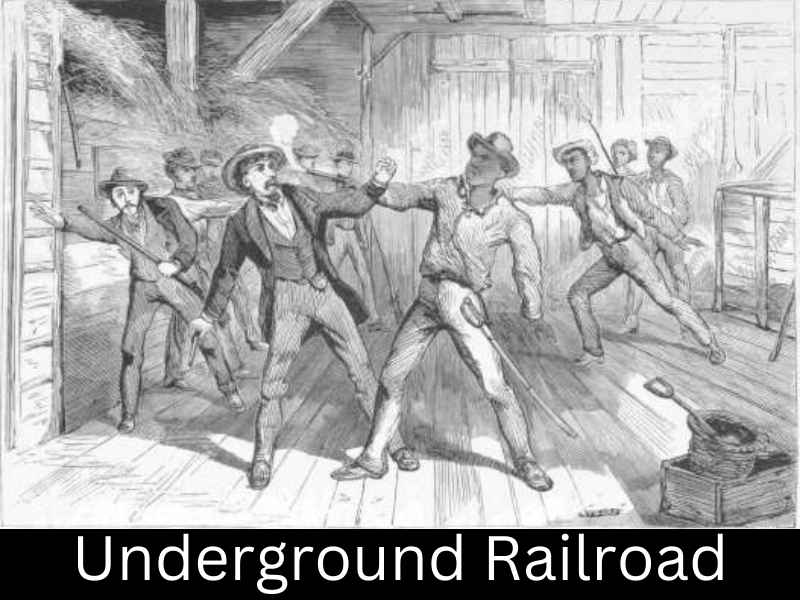This excerpt from William Still’s The Underground Rail Road documents the capture of a fugitive group and the ensuing gunfight in a barn.
The account continues with the daring escape of one of the captured fugitives who was in a very weakened state.
The book refers both to “Robert Jackson alias Wesley Harris” and the opposite i.e. “Wesley Harris alias Robert Jackson”.
So, I’m not sure which is the alias! However, my best guess is that the young man’s real name was Robert Jackson.
Excerpt – Notes By The Vigilance Committee

November 2d, 1853.—Arrived: Robert Jackson (shot man), alias Wesley Harris; age twenty-two years; dark color; medium height, and of slender stature.
Robert was born in Martinsburg, Va., and was owned by Philip Pendleton.
From a boy he had always been hired out. At the first of this year he commenced services with Mrs. Carroll, proprietress of the United States Hotel at Harper’s Ferry.
Of Mrs. Carroll he speaks in very grateful terms, saying that she was kind to him and all the servants, and promised them their freedom at her death.
She excused herself for not giving them their freedom on the ground that her husband died insolvent, leaving her the responsibility of settling his debts.
But while Mrs. Carroll was very kind to her servants, her manager was equally as cruel. About a month before Wesley left, the overseer, for some trifling cause, attempted to flog him, but was resisted, and himself flogged.
This resistance of the slave was regarded by the overseer as an unpardonable offence; consequently he communicated the intelligence to his owner, which had the desired effect on his mind as appeared from his answer to the overseer, which was nothing less than instructions that if he should again attempt to correct Wesley and he should repel the wholesome treatment, the overseer was to put him in prison and sell him.
Whether he offended again or not, the following Christmas he was to be sold without fail.
Wesley’s mistress was kind enough to apprise him of the intention of his owner and the overseer, and told him that if he could help himself he had better do so.
So from that time Wesley began to contemplate how he should escape the doom which had been planned for him.
Excerpt – Robert/Wesley’s Account

“A friend,” says he, “by the name of C. Matterson, told me that he was going off. Then I told him of my master’s writing to Mrs. Carroll concerning selling, etc., and that I was going off too. We then concluded to go together.
There were two others—brothers of Matterson—who were told of our plan to escape, and readily joined with us in the undertaking.
So one Saturday night, at twelve o’clock, we set out for the North. After traveling upwards of two days and over sixty miles, we found ourselves unexpectedly in Terrytown, Md.
There we were informed by a friendly colored man of the danger we were in and of the bad character of the place towards colored people, especially those who were escaping to freedom; and he advised us to hide as quickly as we could.
We at once went to the woods and hid. Soon after we had secreted ourselves a man came near by and commenced splitting wood, or rails, which alarmed us.
We then moved to another hiding-place in a thicket near a farmer’s barn, where we were soon startled again by a dog approaching and barking at us. The attention of the owner of the dog was drawn to his barking and to where we were.
The owner of the dog was a farmer. He asked us where we were going. We replied to Gettysburg—to visit some relatives, etc. He told us that we were running off.
He then offered friendly advice, talked like a Quaker, and urged us to go with him to his barn for protection. After much persuasion, we consented to go with him.
“Soon after putting us in his barn, himself and daughter prepared us a nice breakfast, which cheered our spirits, as we were hungry. For this kindness we paid him one dollar.
He next told us to hide on the mow till eve, when he would safely direct us on our road to Gettysburg. All, very much fatigued from traveling, fell asleep, excepting myself; I could not sleep; I felt as if all was not right.
Betrayal
“About noon men were heard talking around the barn. I woke my companions up and told them that that man had betrayed us. At first they did not believe me.
In a moment afterwards the barn door was opened, and in came the men, eight in number. One of the men asked the owner of the barn if he had any long straw. ‘Yes,’ was the answer.
So up on the mow came three of the men, when, to their great surprise, as they pretended, we were discovered.
The question was then asked the owner of the barn by one of the men, if he harbored runaway negroes in his barn?
He answered, ‘No,’ and pretended to be entirely ignorant of their being in his barn.
One of the men replied that four negroes were on the mow, and he knew of it. The men then asked us where we were, going. We told them to Gettysburg, that we had aunts and a mother there.
Also we spoke of a Mr. Houghman, a gentleman we happened to have some knowledge of, having seen him in Virginia.
We were next asked for our passes. We told them that we hadn’t any, that we had not been required to carry them where we came from.
They then said that we would have to go before a magistrate, and if he allowed us to go on, well and good.
The men all being armed and furnished with ropes, we were ordered to be tied. I told them if they took me they would have to take me dead or crippled.
At that instant one of my friends cried out—’Where is the man that betrayed us?’
Guns And Swords

Spying him at the same moment, he shot him (badly wounding him). Then the conflict fairly began.
The constable seized me by the collar, or rather behind my shoulder.
I at once shot him with my pistol, but in consequence of his throwing up his arm, which hit mine as I fired, the effect of the load of my pistol was much turned aside; his face, however, was badly burned, besides his shoulder being wounded.
I again fired on the pursuers, but do not know whether I hit anybody or not.
I then drew a sword, I had brought with me, and was about cutting my way to the door, when I was shot by one of the men, receiving the entire contents of one load of a double barreled gun in my left arm, that being the arm with which I was defending myself.
The load brought me to the ground, and I was unable to make further struggle for myself. I was then badly beaten with guns, &c.
In the meantime, my friend Craven, who was defending himself, was shot badly in the face, and most violently beaten until he was conquered and tied.
The two young brothers of Craven stood still, without making the least resistance. After we were fairly captured, we were taken to Terrytown, which was in sight of where we were betrayed.
By this time I had lost so much blood from my wounds, that they concluded my situation was too dangerous to admit of being taken further; so I was made a prisoner at a tavern, kept by a man named Fisher. There my wounds were dressed, and thirty-two shot were taken from my arm.
For three days I was crazy, and they thought I would die. During the first two weeks, while I was a prisoner at the tavern, I raised a great deal of blood, and was considered in a very dangerous condition—so much so that persons desiring to see me were not permitted.
Afterwards I began to get better, and was then kept privately—was strictly watched day and night.
Occasionally, however, the cook, a colored woman (Mrs. Smith), would manage to get to see me. Also James Matthews succeeded in getting to see me; consequently, as my wounds healed, and my senses came to me, I began to plan how to make another effort to escape.
Escape In A Weakened State
I asked one of the friends, alluded to above, to get me a rope. He got it. I kept it about me four days in my pocket; in the meantime I procured three nails.
On Friday night, October 14th, I fastened my nails in under the window sill; tied my rope to the nails, threw my shoes out of the window, put the rope in my mouth, then took hold of it with my well hand, clambered into the window, very weak, but I managed to let myself down to the ground.
I was so weak, that I could scarcely walk, but I managed to hobble off to a place three quarters of a mile from the tavern, where a friend had fixed upon for me to go, if I succeeded in making my escape.
There I was found by my friend, who kept me secure till Saturday eve, when a swift horse was furnished by James Rogers, and a colored man found to conduct me to Gettysburg.
Instead of going direct to Gettysburg, we took a different road, in order to shun our pursuers, as the news of my escape had created general excitement.
My three other companions, who were captured, were sent to Westminster jail, where they were kept three weeks, and afterwards sent to Baltimore and sold for twelve hundred dollars a piece, as I was informed while at the tavern in Terrytown.”
Notes By The Vigilance Committee
The Vigilance Committee procured good medical attention and afforded the fugitive time for recuperation, furnished him with clothing and a free ticket, and sent him on his way greatly improved in health, and strong in the faith that, “He who would be free, himself must strike the blow.”
His safe arrival in Canada, with his thanks, were duly announced.
And some time after becoming naturalized, in one of his letters, he wrote that he was a brakesman on the Great Western R.R., (in Canada—promoted from the U.G.R.R.,) the result of being under the protection of the British Lion.
——————————— End Of Excerpt ——————————————–
Source
The Underground Railroad by William Still was published in 1872.
The book is in the public domain. It can be found in the Library of Congress.
Black History Of Last Names
Our website tracks the history of last names. Check out our article on Jackson as an African American surname.